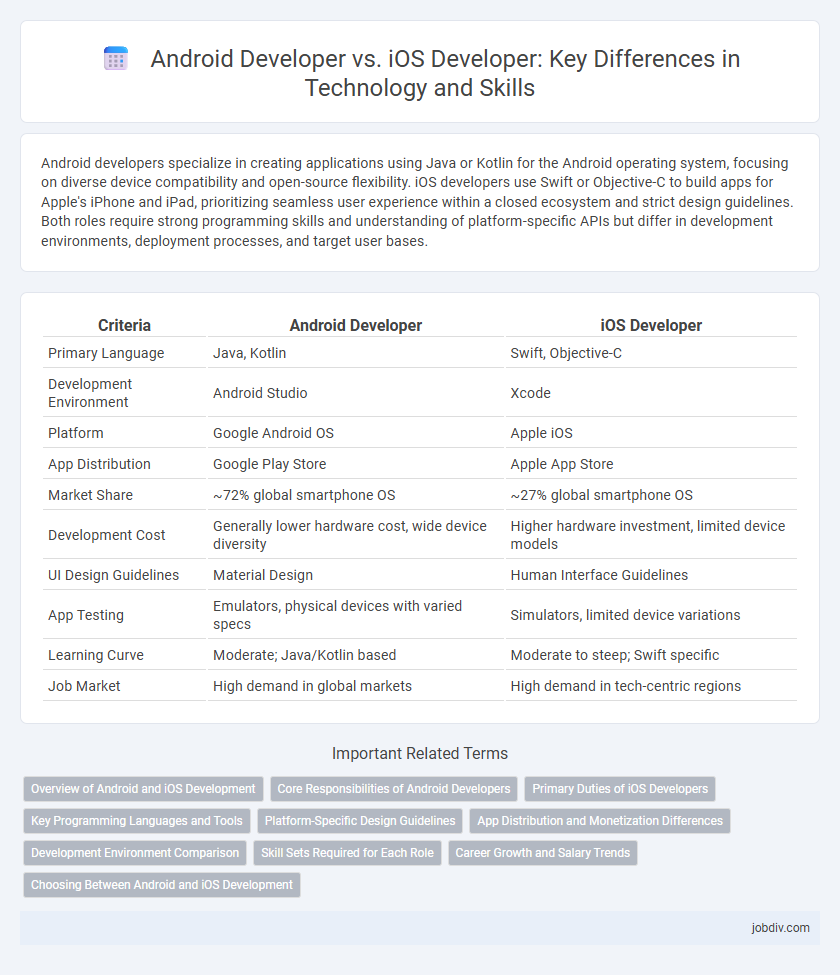Android developers specialize in creating applications using Java or Kotlin for the Android operating system, focusing on diverse device compatibility and open-source flexibility. iOS developers use Swift or Objective-C to build apps for Apple's iPhone and iPad, prioritizing seamless user experience within a closed ecosystem and strict design guidelines. Both roles require strong programming skills and understanding of platform-specific APIs but differ in development environments, deployment processes, and target user bases.
Table of Comparison
| Criteria | Android Developer | iOS Developer |
|---|---|---|
| Primary Language | Java, Kotlin | Swift, Objective-C |
| Development Environment | Android Studio | Xcode |
| Platform | Google Android OS | Apple iOS |
| App Distribution | Google Play Store | Apple App Store |
| Market Share | ~72% global smartphone OS | ~27% global smartphone OS |
| Development Cost | Generally lower hardware cost, wide device diversity | Higher hardware investment, limited device models |
| UI Design Guidelines | Material Design | Human Interface Guidelines |
| App Testing | Emulators, physical devices with varied specs | Simulators, limited device variations |
| Learning Curve | Moderate; Java/Kotlin based | Moderate to steep; Swift specific |
| Job Market | High demand in global markets | High demand in tech-centric regions |
Overview of Android and iOS Development
Android development primarily utilizes Java and Kotlin to create applications compatible with a wide range of devices due to the platform's open-source nature and Google Play Store distribution. iOS development relies on Swift and Objective-C, focusing on seamless integration within the Apple ecosystem, including iPhone, iPad, and macOS, with distribution through the Apple App Store. Both platforms demand expertise in their respective SDKs, design guidelines, and development environments, such as Android Studio for Android and Xcode for iOS.
Core Responsibilities of Android Developers
Android developers specialize in designing, coding, and testing mobile applications specifically for the Android operating system using languages like Java and Kotlin. They handle tasks such as integrating APIs, optimizing app performance, and ensuring compatibility across various Android devices and OS versions. Proficiency in Android Studio, understanding of Android SDK components, and experience with Google Play Store deployment are essential core responsibilities.
Primary Duties of iOS Developers
iOS Developers specialize in designing, building, and maintaining applications for Apple's iOS platform using Swift and Objective-C programming languages. They focus on integrating Apple frameworks such as UIKit, Core Data, and ARKit to create seamless user experiences while ensuring app performance and security compliance. These developers collaborate closely with UI/UX designers and backend engineers to optimize app functionality for iPhones, iPads, and other Apple devices.
Key Programming Languages and Tools
Android developers primarily use Java and Kotlin as key programming languages, leveraging Android Studio as their main integrated development environment (IDE) for app development. iOS developers focus on Swift and Objective-C, utilizing Xcode as their primary IDE to build, test, and deploy applications on Apple's platforms. Both roles require proficiency in SDKs, APIs, and platform-specific frameworks to create optimized and high-performance mobile applications.
Platform-Specific Design Guidelines
Android developers follow Google's Material Design principles, emphasizing adaptable layouts, bold colors, and intuitive navigation tailored for diverse device types and screen sizes. iOS developers adhere to Apple's Human Interface Guidelines, prioritizing clarity, depth, and fluidity with consistent use of gestures and native UI components optimized for iPhones and iPads. Each platform's design framework ensures apps provide a seamless user experience while leveraging unique hardware and software capabilities.
App Distribution and Monetization Differences
Android developers utilize the Google Play Store and alternative app marketplaces, offering greater flexibility in app distribution and pricing models, including ad-based, freemium, and in-app purchases. iOS developers rely exclusively on the Apple App Store, which enforces strict app review guidelines and centralized monetization options such as in-app purchases and subscriptions through Apple's payment system. The differences in platform policies impact revenue share, user reach, and marketing strategies for app monetization.
Development Environment Comparison
Android developers primarily use Android Studio, which offers extensive support for Java, Kotlin, and native C++ development, along with robust emulators and debugging tools. iOS developers work within Xcode, optimized for Swift and Objective-C, featuring integrated Interface Builder and performance analyzers tailored for Apple devices. Both environments provide comprehensive SDKs and simulators, but Android Studio's cross-platform flexibility contrasts with Xcode's seamless integration into the Apple ecosystem.
Skill Sets Required for Each Role
Android developers require proficiency in Java, Kotlin, and familiarity with Android Studio for app development, alongside skills in UI/UX design principles and understanding of Google Play Store guidelines. iOS developers must be skilled in Swift, Objective-C, and Xcode environment, with a strong grasp of Apple's Human Interface Guidelines and integration with iOS frameworks such as Core Data and UIKit. Both roles demand expertise in debugging, testing, and performance optimization to deliver high-quality mobile applications tailored to their respective platforms.
Career Growth and Salary Trends
Android developers experience steady career growth due to the platform's extensive global user base and integration with emerging technologies like IoT and AI. iOS developers often command higher salaries, driven by their expertise in a premium ecosystem and demand for high-quality app experiences. Both career paths offer strong opportunities, but Android roles grow with market expansion while iOS roles benefit from consistent high compensation and exclusive development tools.
Choosing Between Android and iOS Development
Choosing between Android and iOS development depends on target audience reach, development environment, and monetization strategies. Android offers a larger global user base and more flexible app distribution via Google Play and alternative stores, while iOS attracts higher average revenue per user through the Apple App Store. Proficiency in Java/Kotlin or Swift/Objective-C and familiarity with platform-specific guidelines also influence the decision for developers focusing on either ecosystem.
Android Developer vs iOS Developer Infographic

 jobdiv.com
jobdiv.com